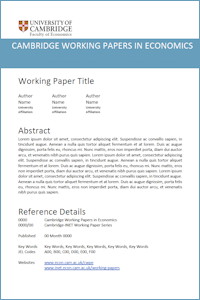
Maeng, F. S.
Default, Inflation Expectations, and the Currency Denomination of Sovereign Bonds
CWPE2438
Abstract: The share of debt denominated in domestic national currency issued by emerging economies has been rising sharply over time—progress away from the “original sin” of invoicing sovereign debt in foreign currencies. Yet this progress has been partial and subject to fluctuations. This paper develops a New Keynesian model with sovereign default where the government can manipulate expected inflation through debt issuance and default policies. High levels of national currency debt incentivize governments to reduce debt repayment by escalating (expected) inflation. Governments tilt the currency denomination of debt towards foreign currency to avoid distortions from escalating (expected) inflation, at the cost of giving up hedging consumption fluctuations of national currency debt. The model highlights default risk as a key factor driving a higher share of debt in foreign currency when expected inflation rises—a pattern observed in inflation-targeting emerging economies. Quantitatively, default risk explains up to 37 percentage points of the share of debt in foreign currency. Optimal debt management contains inflation, default frequency, and spreads.
Keywords: Sovereign Default, Inflation, Currency Denomination, New Keynesian Theory
JEL Codes: E32 E52 E63 F34 H63
Author links: Fred Seunghyun Maeng - Winner of CERF best student paper award
PDF: https://www.econ.cam.ac.uk/research-files/repec/cam/pdf/cwpe2438.pdf 
